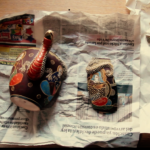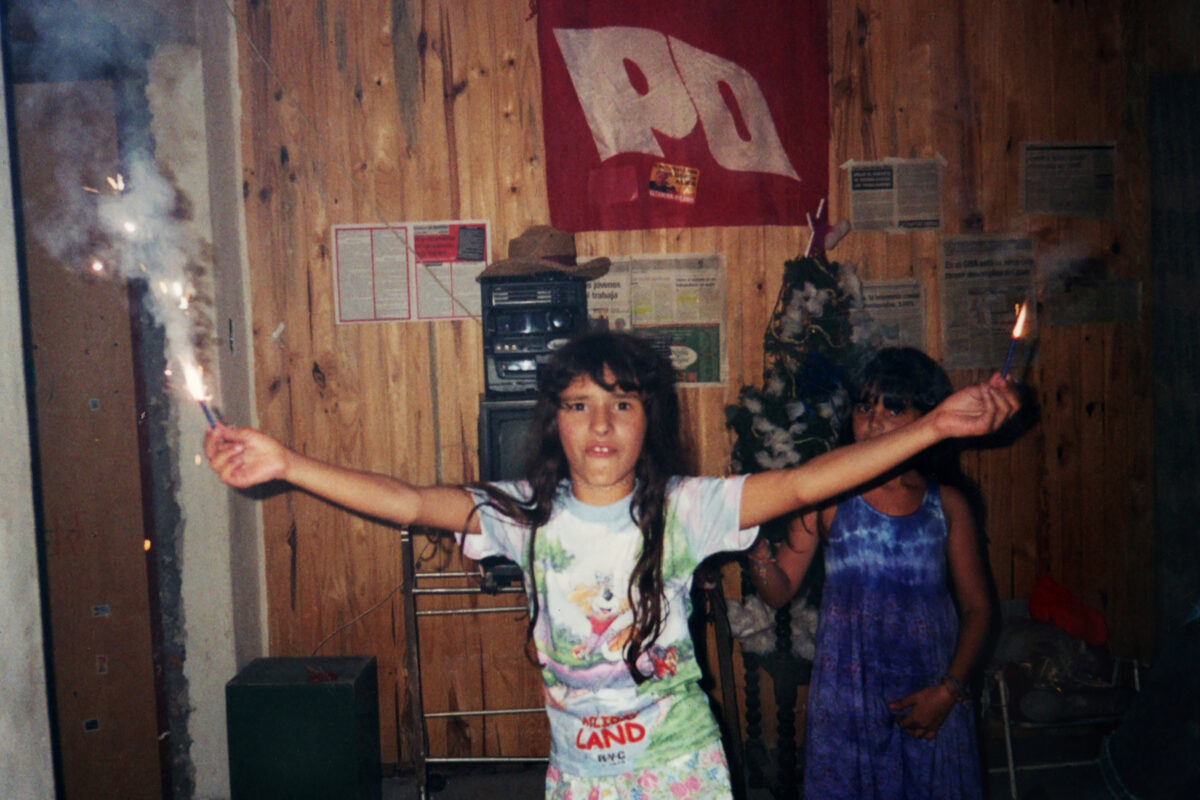Internal Comms
- Technical Info / Información Técnica:
(2024) 01:20:00 / Buenos Aires, Argentina / First Documentary Feature: Found Footage, Video Archive, Cinema, Essay, Autobiography, Crisis, Left-wing, Militancy, 90s, Gender Violence, Politics, Home-Movies, Portrait, Low-Class / 16mm, VHS, Video digital 1080p, 4k / 25 fps / Color / 5.1 / 16:9 / PAL











- Short Synopsis / Sinopsis Corta:
A lower-class family, militants of the Argentinean left, is affected by the father´s expulsion from the party. Meri investigates and searches for answers. They discovers the violence perpetrated by her father and the consequences for the women in the family.
Una familia de clase baja militante de la izquierda argentina se ve atravesada por la expulsión del padre de la organización partidaria. Meri investiga y busca respuestas. Así es que descubre la violencia ejercida por su padre y las consecuencias en las mujeres de su familiar.
- Synopsis / Sinopsis:
Digging through fragile archives, Meri pores through they family’s past. As she tends to her ailing father, Osvaldo, he unveils a monstrous side, while her mother, Flavia, forges her own path. Meri grapples with the paradoxes of the leftist movement, merging the personal and the political in the contemporary landscape.
Mediante archivos precarios, Meri reconstruye su historia familiar; su padre Osvaldo a quien cuida en sus últimos años, se revela monstruoso, su madre Flavia construye su vida y elle se enfrenta a las contradicciones de la izquierda asimilando lo personal y lo político en la actualidad.
- Long Synopsis / Sinopsis Larga:
«Meri unearths memories about Osvaldo, her father, a militant and leader of the Workers’ Party in Argentina. Much like piecing together a shattered vase, she delves into the chronicle of the first accusation of gender violence within that organization. The story winds through both party and family archives, intertwining with the portrait of her mother, Flavia. The director interlaces the family’s history with the Trotskyist narrative and the country’s past. An unsettling journey of discovering and yet still loving a father who unveils his monstrous side, «Internal Comms» stands as a testament, reflecting on the personal and political upheavals that bind three generations of revolutionary activists.»
Meri busca pistas sobre Osvaldo, su padre, militante y referente del Partido Obrero en Argentina. Como quien rearma un jarrón roto, investiga la crónica sobre la primera denuncia de violencia de género en esa organización. Las derivas por el archivo político y familiar dialogan con el retrato de su madre, Flavia. Le directore reconstruye su historia familiar que es, a su vez, la historia del partido y de la historia política del país. Desde la incomodidad de seguir queriendo a un padre que se revela monstruoso, Boletín Interno es un testimonio que reflexiona sobre las crisis personales y políticas que conectan tres generaciones de militantes revolucionarios.
- Director´s Biography / Biografía del Director:
MERI FRANCO MAO
She studied Audiovisual Arts at the Avellaneda National University, Photography Direction at Punto Cine, Analog Photography at the San Martín Cultural Centre, and several workshops, labs and clinics in independent cultural spaces. In his productions he is interested in exploring the links between the intimate and the public, family and politics, property and mental health. INTERNAL COMMS is her first film.
Realizó sus estudios en Artes Audiovisuales en la Universidad Nacional de Avellaneda, Dirección de Fotografía en Punto Cine, Fotografía analógica en el Centro Cultural San Martín y diversos talleres- laboratorios – clínicas en espacios culturales independientes. En sus producciones le interesa explorar los vínculos entre lo íntimo y lo público, la familia y la política, la propiedad y la salud mental. BOLETÍN INTERNO es su ópera prima.
- Director’s Statement / Declaraciones del Director:
My intention with this film is to highlight a series of contradictions I experienced within my family, the affective bonds, and the political organizations I traversed, strongly affected by hetero-patriarchate and gender violence. The socio-economic crisis in Argentina was the breeding ground for multiple forms of violence, which are expressed within the basic unit of society, the family. I am interested in linking the precariousness of the contexts in which the film takes place with the precariousness of the audiovisual device. The archive of this precariousness is linked to the history of struggle and repression in Argentina from the 1990s to the present. This film doesn’t merely aim to heal deep personal wounds but to ponder Osvaldo, my father, as a symptom of an era and customs that declined for both masculinity and activism.
Mi intención con ésta película es poner de relieve una serie de contradicciones que atravesé en el interior de mi familia, los vínculos afectivos y las organizaciones políticas que transité, marcadas fuertemente por la lógica hetero-patriarcal y la violencia de género. La crisis socioeconómica argentina fue, además, el escenario propicio para múltiples violencias, que se ven expresadas en la célula de la sociedad, la familia. Me interesa vincular la precariedad de los contextos en los que transcurre la película con las precariedades del dispositivo audiovisual. El archivo de estas precariedades se enlaza con la historia de luchas y represiones vividas en Argentina desde los 90 hasta la actualidad. Esta película no viene solo a sellar sólo profundas heridas propias sino a pensar a Osvaldo, mi padre, como el síntoma de una época y unas formas que entraron en decadencia tanto para la masculinidad como para la militancia.
- Overview / Ficha técnica:
Script / Guión: Meri Franco Mao
Producer / Producción: Meri Franco Mao, Agustina Pérez Rial
Executive Producer / Prodccióon Ejecutiva: Valentina Flynn
Director / Directore: Meri Franco Mao
Camera / Cámara: Meri Franco Mao, Ivo Aichenbaum
Sound / Sonido Directo: Meri Franco Mao, Nicolás Santa Ana
Sound design / Diseño de sonido: Manuel Embalse
Film Editor / Montaje: Ivo Aichenbaum, Tamara Paine Ciai Averbach
Post-Production Sound/Post-Producción de Sonido: Martín Litmanovich
Original Music / Música original: Selva Aime Ciai Averbach
Color: Ivo Aichenbaum
Graphic Design / Diseño Gráfico: Meri Franco Mao, Eliana Tujschinaider
- Festivals & Awards / Festivales y Premios:
- Links:
Trailer: https://vimeo.com/928128677
Social Networks
https://instagram.com/meri.franco.mao
https://instagram.com/boletin.interno.pelicula
https://instagram.com/fiordestudio
https://instagram.com/agustinaperezrial
https://www.instagram.com/ivo_aichenbaum/
http://instagram.com/films.to.festivals
https://www.facebook.com/films2festivals
http://www.twitter.com/films2festivals
- Contact / Contacto:
GISELA CHICOLINO
FilmsToFestivals Distribution Agency
